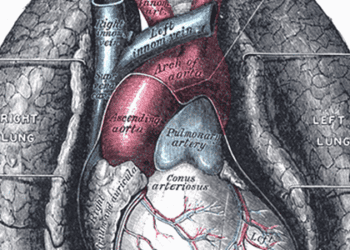[Physician Comment] Better treatment? Increasing survival to discharge observed after in-hospital cardiac arrest
Image: PD
Study author, Dr. Saket Girotra, M.D. talks to 2 Minute Medicine Associate, Interventional CardiologyUniversity of Iowa Hospitals & Clinics. Division of Cardiovascular Diseases.
 “We found that survival in patients with an in-hospital cardiac arrest has improved substantially over the past decade from 13.7% in 2000, to 22.3% in 2009 (P < 0.001). Improvement in survival was driven by both – an improvement in acute resuscitation care as well as post–resuscitation care. Importantly, rates of neurological disability among survivors decreased over this period.
“We found that survival in patients with an in-hospital cardiac arrest has improved substantially over the past decade from 13.7% in 2000, to 22.3% in 2009 (P < 0.001). Improvement in survival was driven by both – an improvement in acute resuscitation care as well as post–resuscitation care. Importantly, rates of neurological disability among survivors decreased over this period.
Our study documents improvement in survival with in-hospital cardiac arrest over the last decade, of a magnitude that is quite remarkable. The magnitude of improvement (8.6 percent) is much larger than seen for other cardiac conditions (e.g., heart attack survival has improved by 3-4 percent) over this period.
If we apply our study’s findings to all patients with a cardiac arrest in the United States (approximately 200,000 people every year), we estimate that an additional 17,200 patients survived in 2009 who would have died in 2000. And, more than 13,000 cases of significant neurological disability were avoided.
While our findings suggest broad-based improvements in the quality of resuscitation care at hospitals, were are unable to identify the specific factors that may be responsible for the improvement in survival, and this would require further study.”
Key findings:
- Survival to discharge after in-hospital cardiac arrest increased from 13.7% in 2000 to 22.3% in 2009.
- The rate of clinically significant neurologic disability among survivors decreased over the same period.
Primer: The four initial electrocardiographic rhythms associated with cardiac arrest are pulseless ventricular tachycardia, ventricular fibrillation, pulseless electrical activity and asystole. Ventricular tachycardia and ventricular fibrillation are associated with better outcomes after in-hospital cardiac arrest but occur in only roughly 1 in 5 cases. Advances in cardiopulmonary resuscitation have led to higher rates of survival in out-of-hospital settings but there is limited evidence describing changes in survival within hospitals. One study using the National Registry of Cardiopulmonary Resuscitation found a survival to discharge rate of 17% but may have included an over-representation of large, urban, academic hospitals and thus, more severe disease. Another study found an 18.3% survival to discharge rate among elderly Medicare patients and associated lower survival rates with patients who were male, older, or of nonwhite ethnicity. This study examined survival to discharge after in-hospital cardiac arrest within a national registry and also considered the clinical significance of survival by investigating rates of neurological disability among survivors.
For further reading, please see the following studies:
- Meaney PA, Nadkarni VM, Kern KB, et al. Rhythms and outcomes of adult in-hospital cardiac arrest. Crit Care Med 2010;38:101-108.
- Ehlenbach WJ, Barnato AE, Curtis JR, et al. Epidemiologic study of in-hospital cardiopulmonary resuscitation in the elderly. N Engl J Med 2009;361:22-31.
- Chan PS, Krumholz HM, Spertus JA, et al. Automated external defibrillators and survival after in-hospital cardiac arrest. JAMA 2010;304:2129-2136.
This [cohort] study: This cohort study examined survival trends in 84,625 adults with in-hospital cardiac arrests in the United States. The primary outcome was survival to discharge. Rates of neurologic disability among survivors were examined using cerebral-performance category (CPC) scores to determine the clinical importance of survival. The overall survival rate was 17.0% and overall survival increased from 13.7% in 2000 to 22.3% in 2009. Results were further analysed according to initial rhythm and the trend was consistent whether rhythms were treatable by defibrillation or not. In spite of increasing rates of survival, rates of clinically significant neurologic disability decreased over time but there was no significant change in rates of severe neurologic disability.
In sum: The overall rate of survival to discharge after in-hospital cardiac arrest increased between 2000 and 2009, while the rate of clinically significant neurologic disability decreased among survivors. The increase in survival rate may be attributed to earlier recognition of cardiac arrest, quality of acute resuscitation, and improvements in training of personnel or post-resuscitation care; however, further studies will be necessary to elucidate which specific factors contributed to the improvement and should be expanded to all hospitals.
Please click to read study in NEJM
Written by [AdC] and [AC]
© 2012 2minutemedicine.com. All rights reserved. No works may be reproduced without written consent from 2minutemedicine.com. Disclaimer: We present factual information directly from peer reviewed medical journals. No post should be construed as medical advice and is not intended as such by the authors or by 2minutemedicine.com. PLEASE SEE A HEALTHCARE PROVIDER IN YOUR AREA IF YOU SEEK MEDICAL ADVICE OF ANY SORT.




